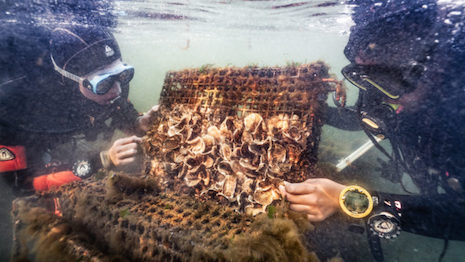 Billion Oyster Project is reintroducing oysters to New York Harbor. Image credit: Von Wong Photography
Billion Oyster Project is reintroducing oysters to New York Harbor. Image credit: Von Wong Photography
Moët Hennessy’s U.S. importer is taking up the issue of restoring oyster reefs in New York Harbor through the support of nonprofit Billion Oyster Project.
Through the new partnership, Moët Hennessy USA will serve as the Champagne and wine sponsor for the organization’s fundraising events, and its employees will donate up to 200 hours towards the cause. Moët Hennessy's partnership reflects parent company LVMH's broader sustainability goals, as the group seeks to put environmental issues at the forefront of its operations.
"The Moët Hennessy USA team is honored to partner with Billion Oyster Project," said Jim Clerkin, president/CEO of Moët Hennessy North America, in a statement. "As an organization that is committed to the seven areas of sustainability – including water and effluents – embarking on this journey with Billion Oyster Project is an outstanding way to support a local program that also aligns with our dedication to sustainable development."
Reef restoration
Oysters play a key role in marine ecosystems. Oyster reefs can provide a habitat for other sea life, and they filter water.
In New York Harbor, the reefs help to protect the shoreline during storms.
Billion Oyster Project collects shells from 75 New York restaurants, including Moët Hennessy accounts such as Mandarin Oriental and Per Se. These shells serve as a home for larval oysters, which can only survive if they find a hard surface to attach to.
So far, the project has planted 13 reefs, and 30 million oysters have been planted.
Instagram post from Billion Oyster Project
In addition to its work physically restoring reefs, Billion Oyster Project conducts educational programs for local schools.
As part of its new partnership with the nonprofit, Moët Hennessy USA will sponsor the organization’s fundraisers in 2020, including The Billion Oyster Party and Harbor Up! events.
"Billion Oyster Project is proud to be partnering with Moët Hennessy to grow our community, in size and enthusiasm, around restoring New York Harbor," said Pete Malinowski, executive director of Billion Oyster Project, in a statement. "Each shell collected, oyster planted and classroom engaged propels our movement forward — and closer to a healthier harbor."
Moët Hennessy's sea-based sustainability efforts extend beyond the New York market.
In 2017, LVMH-owned Scottish distiller Glenmorangie launched a two-fold project to clean the wastewater produced during the whisky-making process.
Glenmorangie’s projects will work to purify and clean the waters near the whisky brand’s distillery on the Scottish coast by reintroducing native oysters and through the opening of an anaerobic digestion plant. Across sectors, brands have launched corporate social responsibility efforts that work to protect the environment from manufacturing (see story).
